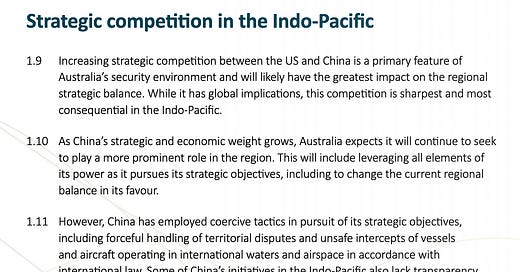It is starting to feel like the US-China stabilization around the Xi-Biden meeting last November is getting very shaky. Here is an incomplete list of some of the issues that are heating up:
the claims around overcapacity;
the almost concluded USTR review into trade practices by the Chinese government regarding steel and aluminum which Biden referenced in his call to raise tariffs;
the 301 investigation USTR announced today into “acts, policies, and practices of the People’s Republic of China (PRC) targeting the maritime, logistics, and shipbuilding sectors for dominance”;
the increasing likelihood that the bill to force a divestment or a ban of TikTok may pass this weekend;
the US-Japan and US-Japan-Philippines meetings last week;
the upcoming annual US-Philippines military drills that have been expanded this year, as well as the ongoing tensions over Second Thomas Shoal and the Sierra Madre;
the increasingly vocal and detailed claims about the PRC helping Russia rebuild its defense industrial base;
the investigation into connected vehicles;
the ever-expanding controls on technology exports
It is hard to see how things improve from here in a US election year, and a lot easier to envision scenarios in which things could get much rockier very quickly. Sorry to be a bearer of negative energy, but when you look at everything going on the “San Francisco Vision” the PRC has been pushing since November can become very blurry.
Summary of today’s Essential Eight:
TikTok bill may pass this weekend - The House may now include the bill that would force a ban of TikTok if Bytedance did divest in a package of foreign aid bills for Israel, Ukraine and Taiwan. If those pass the House this weekend they will pass the Senate and may become law by next week. The only reported change to the already passed House bill is the option to extend the period for divestment by another 180 days. Bytedance would try to fight the law in court, but passage will likely be extremely damaging to TikTok in the US as smart creators will start hedging with other platforms like Instagram and Youtube given the uncertainty over the future of the platform.
US-Philippines exercise - From the Washington Post: “For the first time since the annual [Balikatan] exercise started in 1991, the Philippines and the United States will conduct joint naval drills beyond the 12 nautical miles of the Philippines’ territorial waters, in parts of open sea claimed by China, officials said. More than 16,000 soldiers from the two militaries will operate out of a joint command center to perform four major activities with a focus on countering maritime and air attacks.”
Australia increases defense spending, adjusts defense strategy to deal with China. Some of the key drivers of the changes:
Was Scholz’s PRC trip a success? I would love to hear from readers who have more knowledge of the trip; it is easy to criticize him but I am hopeful his trip was more productive than it appears from reports.
NDRC press conference on the economy - At an April 17 press conference officials from the National Development and Reform Commission addressed a series of issues including overcapacity, ultra-long sovereign debt, the private economy, and the 1 trillion RMB special government bonds projects, which the NDRC said should all have started implementation by June.
Micro-cap stock rollercoaster - Friday’s nine guidelines spooked investors in micro caps. Caixin noted that “the Wind Micro Market Cap Index, which tracks 400 of the smallest-cap Chinese mainland-listed companies with a market value typically between 1.3 billion yuan ($180 million) and 2.5 billion yuan, lost 8.9% on Monday and 10.6% on Tuesday, before recovering some of its losses on Wednesday, when it closed 9.7% higher.” The concerns over regulatory problems for micro cap stocks, assuaged for now Tuesday night by a CSRC official, may also wreak havoc for quant funds. As I wrote Monday when discussing the new nine guidelines “policymakers really need to figure out how to create sustainable and healthy paths to liquidity for high technology startups seen as key to breaking through the American led technology suppression, as major foreign capital markets are mostly closed to those enterprises now.”
New plan to train and recruit digital talent - Nine ministries and government agencies have issued the “Action Plan for Accelerating the Cultivation of Digital Talent to Support the Development of the Digital Economy (2024-2026)”. One action the plan calls for is to “conduct international exchange activities for digital talent. Increase support for digital talent, introduce a group of high-level digital talent from overseas, support a group of returning students with overseas experience in innovative entrepreneurship, and organize a batch of high-level digital talent from overseas to serve back in the country”. If the US and other countries are serious about competing with China, they should do much more to attract and retain some of the amazingly talented people from China.
And don’t forget to listen to this week’s episode of the Sharp China podcast - Germany’s Hopes for China; Q1 GDP Growth; National Security Day and Transnational Repression; Another TikTok Report.



